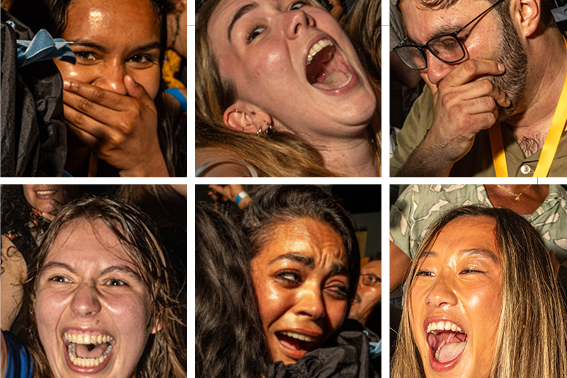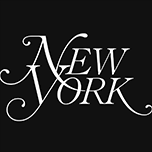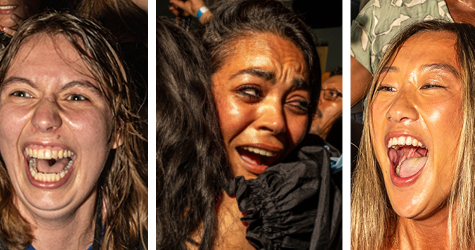 Photo-Illustration: Intelligencer; Photos: Alex Kent for New York Magazine
Photo-Illustration: Intelligencer; Photos: Alex Kent for New York Magazine
On Election Night, as the polls for New York’s Democratic primary closed, Melissa Lozada-Oliva was crammed into a watch party at a bar in Gowanus, staring at news updates on a projector screen alongside a blue-and-gold crowd of white-knuckled locals desperate for Zohran Mamdani to win. Lozada-Oliva, a 32-year-old novelist and poet, had never canvassed for anyone before, but she spent the past few months door-knocking for Mamdani in her neighborhood of Crown Heights, moved by his message about a city everyone can afford. She had no idea what to expect. The bar was too loud to hear the news announcer. Numbers flashed on the screen. “And then those big letters of ANDREW CUOMO IS CONCEDING came and it was just — it was a zoo,” she said. “People were crying. Hugging strangers. It was like sports, if sports mattered.” (“No offense,” she added.)
The left isn’t used to this — winning. It’s not even used to coming close. Watching Cuomo concede (and so quickly!) felt like a glitch, a prank, a football anyone could yank away. The win was being called the biggest upset in modern New York history. The next day, the cover of the New York Post called Mamdani a “radical socialist” with the headline NYC SOS. Fox News reported, “Outrage erupts after NYC socialist wins Dem primary.” Meanwhile, my social feeds were full of Mamdani interview clips and cutesy pics of him and Brad Lander riding Citi Bikes and the occasional harder-core leftist scolding everyone else for endorsing electoral politics. There was an air of unreality about it all. And a clarity: Of course most
people feel broke. Of course young New Yorkers care about immigrants and Gaza. And of course they want a mayor who sees that. “It’s nice to be right!” Lozada-Oliva said. She was far from the only Mamdani volunteer canvassing for the first time; she said the people she knows had “no choice” but to get invested because the status quo is so distressing: “The amount of joy we were feeling Tuesday night — this feral joy — would not have been possible if we didn’t feel despair for this country.” The weekend before the primary, she had been canvassing with a group at City Point mall in Downtown Brooklyn when a South Asian security guard came up to them. “I thought he was gonna kick us out, and we were like, ‘Ah, sorry,’ ” she said. “And he was like, ‘No, no, no. I wanted to tell you: I think this is the man who’s gonna change everything.’ ”
I had to go to Brooklyn, the borough that arguably won it for Mamdani — he dominated there by 17 points. Primary Day had been the hottest day in New York in over a decade, a horrid 102 degrees in some parts of the city, sending over a hundred people to the emergency room. The next day was hardly cooler. I got off the Q at Parkside Avenue, near Flatbush, my phone at 2 percent. I ducked into a narrow cell-phone store to buy a charger. A ZOHRAN poster was taped to the shop window. I asked the person working there, a middle-aged Yemeni man named Fuad, if he’d voted the day before — and he had, in Bensonhurst, for Mamdani. “I don’t know too much about him, but he said he’s gonna freeze the rent,” he said. Last time around, Fuad had voted for Adams. “In the beginning, they started good, but I need somebody much better,” he said. “Work is too much. I need someone to make a discount. Right now, the train’s $2.90.” I pointed out that if Mamdani were elected, he’d be the first Muslim mayor, and Fuad nearly rolled his eyes at my pandering. “I don’t care about the religion. Everybody lives in the city: Muslim, Jewish, Christian,” he said. “We need somebody to try to change — people to serve the city better.”
On Parkside Avenue, a teen walked along the sidewalk in a high-school-graduation gown, his CONGRATS, GRAD! helium balloon drooping. The primary results for this area split in a stark north-south zigzag between Flatbush and East Flatbush, somewhere around Rogers Avenue. West of the line went for Mamdani, right of the line for Cuomo. Justin Freeman, a 43-year-old Army veteran, DSA member, and organizer who works for State Assemblymember Phara Souffrant Forrest, grew up around that dividing line and canvassed the area for Mamdani. “The Zohran campaign activated me in a different way. I felt like I could be taken seriously about my ideas because this brown man is doing it,” he said. In the spring, he went out with a group of organizers called We Grew Here to do their own, self-organized canvass in Black and brown neighborhoods like Canarsie and East New York that Freeman says the official Mamdani campaign wasn’t hitting. They were trying to reach voters — including older Black people — whom Cuomo was expected to sweep. “I tried to relationally organize as much as I could. I spoke with my mom, and as much as I talk about leftist politics and things like that … yeah, she was skeptical,” he said. “My mom was Afrocentric and came up through the Black Power movement. I feel like a lot of Black folks have had their ideas of collective organizing COINTELPROED out of them” — referring to the FBI counterintelligence program that targeted the Black Panthers and other activist groups. “They want to survive, and they’ve been burned by politics.”
I’d chosen the wrong shoes for my walk, so I went to a pharmacy on Flatbush Avenue to buy Band-Aids. “I don’t vote for the mayor,” said Angela, who was working the register. When I asked why, she settled me down on a folding chair and gave me a small battery-powered fan to hold so I’d be comfortable while we talked. “I don’t vote because it’s not benefiting me none,” she said. “Because, to me, all of them are crooks. Like the Adams guy, you remember about him? Just because he’s Black he don’t get no Brownie points. They’re not paying my bills. I work two jobs to pay my bills” — here at the pharmacy and as a home health attendant. She told me her sister always votes and posts about it on Facebook, which Angela finds goofy. Although, she admitted, giggling, she had noticed the ZOHRAN poster taped up in the window of the pharmacy and had seen some segments about him on the news. “He’s hot,” she said. “If I would vote for somebody, it would be him, I guess, because he’s cute. Yeah, I’m being honest.” There are worse reasons, I said. “I know it,” she said. “I might be wrong, but I believe he’s a good person.”
There are still a lot of New Yorkers who have no idea who Mamdani is. I wondered how many even knew there had been a mayoral primary; only a third of registered Democrats voted. Back in Manhattan and sweating profusely, I went up to a halal cart by Bowling Green and asked the guy working it if he’d heard about the election the day before. “No, no,” he said, “I had to work 12 hours!” Down at the Battery, red-faced tourists who looked like they were regretting their choices trudged in search of a ticket to the Statue of Liberty. Two guys stood in the middle of the wide part of the sidewalk flanking a large cooler, holding umbrellas for shade and calling, “Ice-cold water, one dollar!” through megaphones. I walked up to one of them, a wiry middle-aged man with a chinstrap beard and backward cap, and asked him if he’d voted the day before. “Yes, but I don’t tell anyone who I vote for,” he said, narrowing his eyes at me. “That’s private. You don’t discuss that with anyone. Except your priest. Or the president …” I was neither. I took my leave. As I walked away, he called after me through the megaphone: “Sorry, young lady! Thank you!”
Switching tactics, I approached a cluster of tour-company employees selling ferry and helicopter rides and asked them what they thought about someone whom everyone knows: Eric Adams. Since it was looking as though Cuomo’s funders were wavering, the current mayor had picked up his campaigning. He’d already been planning to run as an independent on one of the two party lines for which he’s gathered signatures: “EndAntiSemitism” and “Safe&Affordable.” After the primary, he decided to go with the latter. One woman immediately turned around and walked away when I said his name, while her 20-something co-worker started singing “Eric! Eric Adams!” He laughed. “I don’t like Eric Adams. He’s trying to be Dominican so bad.” He introduced himself as “Pedro from the block” (Dominican, from Williamsburg) and showed me a video on his phone of Adams attempting to merengue at a party in Inwood. Pedro let the video loop again and again, laughing his ass off. “He gained so much clout, like? He’s not even doing what he’s supposed to be doing in New York,” he said. “He’s buggin’.” Had he heard of Mamdani? “I think so, I think I heard of him,” said Pedro. I asked if he knew anything about him. “No, but I will vote for him,” he said. “But he gotta pay me!”
By the end of the week, a smear campaign against Mamdani had kicked into high gear. SCAMDANI read the cover of the Post on Thursday with a quote from Adams calling Mamdani “a snake-oil salesman.” Lozada-Oliva was still excited, but her fear had returned. “We have to make it past whoever Bill Ackman” — the billionaire hedge-fund manager who supported Cuomo — “chooses to back,” she said. Freeman felt much the same: “It’s ‘Job’s not finished’ — on some Kobe shit.” He told me he couldn’t quite forget what had happened to India Walton, the DSA-backed democratic-socialist candidate who defeated Buffalo’s incumbent mayor in the Democratic primary in 2021 — only to lose to him in the general election when the incumbent ran as a write-in. “I was excited about a Black socialist woman mayor. It was heartbreaking,” he said. “There’s a shadow of that race hovering over this victory. Sometimes I see it. It’s like, ‘Why you blocking my sun right now? I’m trying to bask in a Zohran win.’”
More on Zohran Mamdani
Zohran Mamdani on Why He WonZohran Mamdani’s Win Prompted a Full-Fledged Elite MeltdownWill Democrats Learn Zohran Mamdani’s Lesson on Israel?
From Intelligencer - Daily News, Politics, Business, and Tech via this RSS feed


